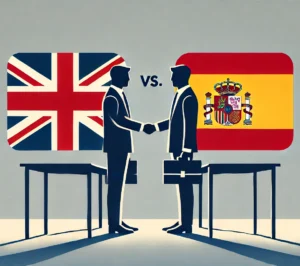WHICH IS BETTER TO HAVE A COMPANY IN THE UK OR SPAIN?
 So, which is better, to have a company in the UK or Spain? In this article we will compare both destinations in terms of tax, infrastructure, access to markets, talent and other key factors to help you decide which is the best option for you.
So, which is better, to have a company in the UK or Spain? In this article we will compare both destinations in terms of tax, infrastructure, access to markets, talent and other key factors to help you decide which is the best option for you.
As an entrepreneur, choosing where to set up your business is one of the most important decisions you have to make. Both the UK and Spain can offer attractive business opportunities, but each country has unique characteristics that may make one or the other more suitable.
Tax system: UK vs. Spain
United Kingdom: a competitive tax system
The UK stands out for having an attractive tax system for companies. Its corporate tax is lower compared to many other European countries, making it a popular destination for international entrepreneurs.
In addition, the system is designed to encourage investment and innovation through tax incentives, such as deductions for research and development.
Additionally, VAT rates (known as VAT in the UK), are standard at 20%. However, companies can benefit from exemptions depending on their turnover.
Spain: a more complex tax system
Although Spain has a robust market, it offers a more challenging tax environment. Corporate tax rates range from 25% to 30%, depending on the size and turnover of the company, which can be a point against small companies and startups.
In addition, social security contributions are considerably high, which increases labour costs.
Also, VAT in Spain is 21%, but with reduced rates on certain products and services, which can be beneficial depending on the sector in which your company operates.
Infrastructure and market access
UK: a world-class infrastructure
The UK has a world-class logistics infrastructure and advanced technology. From high speed rail networks to strategically located international airports, businesses have rapid access to global markets. In addition, cities such as London, Manchester and Edinburgh are innovation hubs that foster business development.
Although Brexit has changed trade relations with the European Union, the UK remains a gateway to global markets, especially in North America, Asia and the rest of Europe.
Spain: a privileged location in Europe
Spain offers a strategic location within the European Union, which facilitates access to one of the largest markets in the world. Its transport network, with high-speed trains, seaports and international airports, is also a plus for companies looking to expand.
In addition, Spain acts as a bridge to Latin America, thanks to its historical and cultural ties, which can be a significant advantage for companies interested in that market.
Talent and labour costs
UK: access to skilled talent
The UK is renowned for its access to highly skilled talent, especially in sectors such as technology, finance and science. World renowned universities such as Oxford and Cambridge help to train professionals to meet the challenges of global marketplace.
However, labour costs in the UK are relatively high, especially in large cities such as London, where the average salary is higher. In addition, post-Brexit migration policies may limit access to international talent.
Spain: competitive talent at lower cost
Spain also offers a well educated workforce, especially in sectors such as tourism, renewable energy and construction. Moreover, labour costs in Spain are lower than in the UK, which can be a significant advantage for companies seeking to maximise profit margins.
Also, youth unemployment in Spain remains a challenge, but this may translate into a greater availability of talent for employers.
Business environment and ease of doing business
UK: a favourable environment
The UK consistently ranks high in the ease of doing business rankings. Bureaucracy is minimal, and the processes for registering a company are fast and digital. This makes the UK particularly attractive for startups and technology companies.
In addition, the UK’s legal framework is transparent and reliable, providing legal certainty for entrepreneurs.
Spain: bureaucracy and regulations
In contrast, Spain has a more bureaucratic system, which can slow down the process of setting up a company. From obtaining licenses to registering with social security, the procedures can be complex and time-consuming. However, the Spanish government is implementing reforms to improve digitalisation and simplify processes.
Quality of life and lifestyle
UK: an urban and innovate approach
The UK, with its cultural diversity and urban dynamism, offers and attractive lifestyle for many entrepreneurs. London, in particular, is a hub for businesses and culture, although the cost of living can be high.
Spain: a vibrant and accessible destination
Spain, meanwhile, is known for its high quality of life, with a warm climate, rich culture and a more affordable cost of living. This can be a key factor for entrepreneurs seeking a work-life balance.
Conclusion: which one is better for you?
The choice between the UK and Spain depends largely on the specific needs of your business:
-
-
- UK is ideal for tech companies, startups and businesses looking for access to global markets, with a competitive tax system and an agile business environment.
- Spain, on the other hand,, is an excellent choice for companies that value proximity to the European Union, lower labour costs and a more relaxed living environment.
-
Both countries offer unique opportunities, but the best destination will depend on your business model, industry and long-term goals. If you are ready to decide, carefully analyse these factors and take the first step towards business success. Choose the country that best aligns with your goals and start building your future today!




